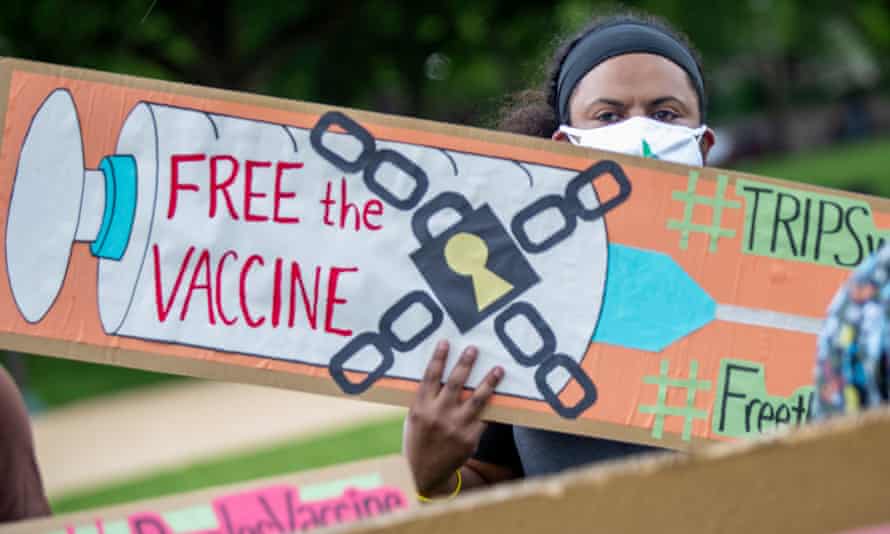Extract from The Guardian
US now supports bid to allow poorer nations to make cheap copies of vaccines, but Australia is holding out
US declares support for patent waiver on Covid-19 vaccines

Last modified on Thu 6 May 2021 16.38 AEST
Pressure is mounting on Australia to support the waiver of intellectual property protections for Covid-19 vaccines after the United States reversed its long-held opposition to announce they will back the plan.
Australia is now one of the last countries not to have thrown its support behind the waiver proposal at the World Trade Organization, after India and South Africa – who have led a global push for the waiver since October – agreed to revise their proposal after a key meeting on Friday.
The proposal to waive patent protections only for the duration of the pandemic has been supported by more than 100 countries, mostly lower- and middle-income nations, to allow them to manufacture and sell cheaper generic copies of vaccines to help achieve a quicker end to the global pandemic.
Following lobbying from pharmaceutical companies who own Covid-19 vaccine formulas, the US, UK, EU and Switzerland and a handful of other countries with strong vaccine manufacturing industries had been strongly opposed to the waiver.
Australia had indicated willingness for a compromise position on the waiver, however the proposal had ultimately been blocked repeatedly because of the WTO’s consensus-based system requiring absolute support, as opposed to a majority voting system.
Overnight, US trade representative Katherine Tai announced the US’s updated position, saying “these extraordinary times and circumstances call for extraordinary measures”.
“The [Biden] administration believes strongly in intellectual property protections, but in service of ending this pandemic, supports the waiver of those protections for Covid-19 vaccines.
“We will actively participate in text-based negotiations at the WTO needed to make that happen,” Tai said.
Following the US announcement, New Zealand indicated the country would follow suit.
The World Health Organization director general, Tedros Adhanom Ghebreyesus, called the US’s support for the waiver “a monumental moment in the fight against Covid-19”, and called on the remaining holdout countries to follow.
Tedros, along with vaccine experts, unions and human rights groups including Médecins Sans Frontières and Amnesty International, previously warned that the longer Covid-19 circulates in developing nations, the greater the chance more deadly and vaccine-resistant variants emerge that could stifle immunity in wealthy, well-vaccinated countries.
The Australian Fair Trade and Investment Network has heralded the US’s move, with convenor Patricia Ranald confident it will hasten Covid vaccine access in developing nations.
“This is a major breakthrough, driven by determined civil society campaigning in the USA and globally, and should result in temporary changes to World Trade Organization rules as soon as possible,” Ranald said.
“It is now time for the Morrison government to do the same,” she said.
The opposition trade spokeswoman, Madeleine King, urged the Morrison government to back the waiver, but said the initiative is “not the whole solution”.
“Rather than obstruction, the Morrison government should be working with international partners, the WTO and industry to ensure a waiver can be implemented constantly with the highest safety standards.
King noted the complexities of WTO negotiations, and warned any proposed motion “will take time to resolve”.
“In the meantime, it is critical to the health of people around the world that collaborative multilateral action between nations and international institutions outside the WTO continues to urgently seek solutions to ensure vaccines are available to all,” King said.
The Greens spokeswoman for international aid, Mehreen Faruqi, said “Australia must immediately follow suit”.
“We are one of the holdouts and it’s morally indefensible,” she said.
Amnesty International’s secretary general Agnès Callamard welcomed the US’s position as a “bold step for global solidarity”, and said “other rich states such as Australia, Brazil, the EU and UK must now follow suit”.
“Only by sharing knowledge and technology can the production of vaccines be accelerated to reach as many people as fast as possible. The only way to end the pandemic is to end it globally. The only way to end it globally is to put people before profit.”
The Guardian contacted Australia’s trade minister Dan Tehan to ask if Australia would adopt the same position as the US, but he stopped short of pledging support for the waiver.
In a statement, Tehan said “we welcome this positive development and look forward to working with the US and others to find solutions that boost the global rollout of Covid-19 vaccines”.
“The WTO director general has been working on an outcome for some weeks and I was pleased to discuss a way forward with her, including the proposal put forward by the International Chamber of Commerce, when we met in Geneva recently.
“Close collaboration between governments and vaccine manufacturers will remain vital,” he said.
When Scott Morrison was asked about the US’s shift on Thursday morning, he said it was “tremendous news”, but did not say whether Australia would change its position.
When asked about the waiver in March, Tehan said “we’ve got to make sure that there are some protections in place for the millions of dollars that has gone into the research to create these vaccines”.
After the US announcement, shares in a number of makers of vaccines for Covid-19 tumbled, reported Reuters.
A suspension in IP rights is needed because the existing rules under the WTO’s trade-related aspects of intellectual property rights require member nations to provide patent protection for at least 20 years.
More than 85 poor countries are not predicted to achieve widespread vaccination rollout before 2023, if at all, because of licensing rules and distribution limits.
No comments:
Post a Comment